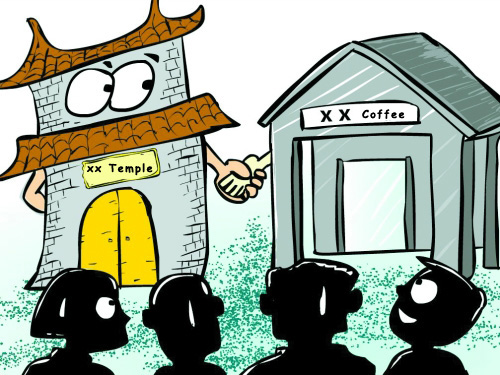Why can't Starbucks lie beside Lingyin Temple?
- By Wei Yingjie
 0 Comment(s)
0 Comment(s) Print
Print E-mail People's Daily, September 28, 2012
E-mail People's Daily, September 28, 2012
Like the controversy about the Starbucks shop in the Forbidden City three years ago, the opening of the Starbucks shop in the Lingyin Temple Scenic Area in Hangzhou has also caused quite a stir among Chinese citizens.
|
|
|
[Henan Business Daily] |
It is important to know where exactly the new store is located. If it is located inside the Lingyin Temple, it is of course controversial. However, if the new coffeehouse is located just in the commercial zone of the Lingyin Temple Scenic Area, arguing over it will be really pointless.
In fact, the new Starbucks outlet is located in the leisure and shopping zone of the scenic area, and quite far away from the temple. Furthermore, there is already a Zhiweiguan restaurant serving classic Hangzhou cuisine, a KFC, a supermarket, among others, near the new Starbucks shop. At this point, even the reporter cannot help wondering whether Starbucks is doing a self-hype.
There are many similar stores in Hangzhou's scenic areas, including the popular clubs near the West Lake, "agritainment" restaurants in the Santai Mountain Scenic Area, and restaurants in West Lake Longjing Village. Some temples rebuilt in recent years have turned into teahouses or restaurants. Many cafes such as C. Straits Cafe and Starbucks outlets lie amid the beautiful scenery of the West Lake. Most antique-style stores there are just pseudo-classic buildings, but many people will feel inconvenient if these stores are forced to close due to unsightliness or "adverse effects" on scenic spots.
Cultural attractions and stores are interdependent in modern tourism. Cultural attractions attract visitors, while stores bring revenue to local tourism. There is no such thing as a place of interest without nearby stores. If many people oppose setting up a Starbucks outlet in the scenic area due to concerns it may bring the stink of money, the first thing they should oppose is temples charging admission fees. By extension, they should also oppose the sale of souvenirs or donation of money at any temple. If they cannot do that, they should admit the reasonableness of the existence of these stores in scenic areas.
Starbucks' selling coffee in the Lingyin Temple Scenic Area is no different from local companies' selling Longjing tea. In essence, they are both commercial behaviors, and there is no reason to oppose them as long as local governments approve them.
It will be a different story if the new Starbucks outlet is located inside the Lingyin Temple and occupies certain space of the heritage site. It is not a matter of whether a scenic area should allow commercial behavior, but whether such behavior conflicts with the protection of historical relics. Related government agencies should stick to giving top priority to the protection of historical relics, and solicit suggestions and advice in this regard from the public.







Go to Forum >>0 Comment(s)